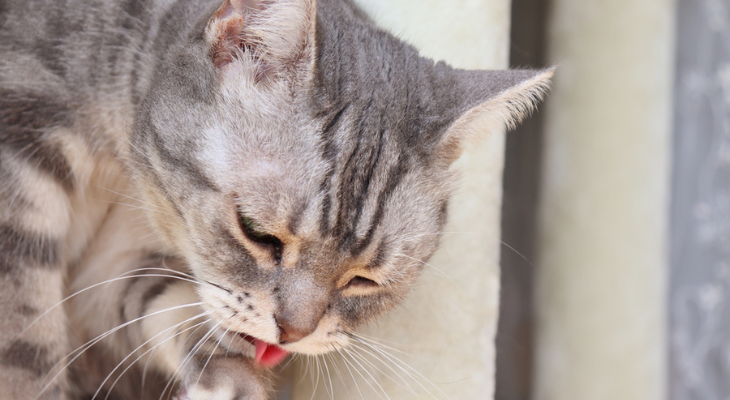
What Causes Nausea in Cats?
If your cat isn't its usual energetic self, nausea could be to blame. Unfortunately, it's not always easy to determine why your favorite feline is under the weather. Nausea can be caused by a variety of conditions, ranging from food sensitivities to constipation to kidney or liver disease.
How to Tell if Your Cat Is Nauseated
Vomiting is a sure sign that your cat doesn't feel well, but nauseated cats don't always vomit. If your furry friend is nauseated, you may notice one or more of these signs:
- Disinterest in Food
- Drooling
- Dry Heaving
- Increased Meowing
- Grooming More Than Usual
- Licking the Lips
- Fatigue
Sick pets also tend to hide under beds or in other out-of-the-way places. In the wild, predators prey on sick and weak animals. Hiding is a natural instinct that protects your pet from predators, even though your house is predator-free.
Common Nausea Causes
Nausea can be caused by:
- Food Problems. If you recently changed your pet's food, it may take a while for your cat's stomach to adjust to the new food. Allergies or sensitivities to food may also cause nausea.
- Hairballs. Hairballs normally come back up naturally, but that's not always the case. Nausea could be due to clumps of hair blocking your cat's gastrointestinal tract.
- Parasites. Worms and other parasites can make your poor pet feel queasy. If the parasitic infection isn't treated promptly, your cat could become dehydrated due to vomiting and diarrhea.
- Constipation. If your cat hasn't been making its usual deposits in the litter box, constipation could be to blame for nausea.
- A Virus. Your cat's nausea could be caused by a viral illness. Among the illnesses that may trigger nausea are rotavirus, coronavirus, feline panleukopenia, or feline infectious peritonitis.
- Foreign Bodies. Your pet may have swallowed a non-food item that's become stuck in the gastrointestinal tract.
- Toxins. Swallowing toxic substances in pesticides, plants, essential oils, human medication, cosmetics, and cleaning products can cause nausea and vomiting.
- Motion Sickness. Do you only notice symptoms after your cat has been for a ride in the car? Just like people, some cats are susceptible to motion sickness.
- Diseases. Liver disease, diabetes, thyroid disease, pancreatitis, vestibular disease, and other diseases and illnesses can trigger nausea. Kidney disease could also be the cause. Chronic kidney disease affects 1 to 3% of all cats and 30 to 50% of cats over age 15, according to an article in Today's Veterinary Practice.
- Medications. Nausea can be a side effect of medications used to treat diseases and illnesses.
- Cancer. Although most cases of nausea are not caused by cancer, queasiness can be a sign of the disease.
Treating Nausea
Mild nausea often improves on its own. If your cat is nauseated for more than 24 hours, it's time to make an appointment with the veterinarian. Call immediately if you notice any of these signs:
- Fever
- Frequent Vomiting or Dry Heaving
- Trouble Breathing
- Weakness or Extreme Fatigue
- Blood in Vomit or Feces
- Pain
- Difficulty Urinating
Your pet's veterinarian will perform a thorough examination that may include blood and urine testing. Blood tests can help rule out common causes of nausea, like liver or kidney disease, hyperthyroid disease, electrolyte problems, or other issues. If your veterinarian suspects that the nausea is caused by parasites or a bacterial infection, a fecal test may be recommended. X-rays or ultrasound scans can help your pet's doctor determine if blockages, foreign bodies, tumors, or pancreatitis are to blame for your cat's symptoms. Endoscopy, an examination of the esophagus, stomach, and intestinal tract with a flexible, lighted wand, may also be used to spot tears in the gastrointestinal lining, tumors, or inflammation.
Treatment of nausea varies depending on the cause. If a food intolerance or allergy is the problem, switching to another type of food may offer a simple solution. Surgery may be needed to remove blockages or tumors. Treating underlying conditions, like diseases and parasitic infections, can improve nausea. If your pet is dehydrated, the veterinarian may provide subcutaneous fluids to increase your cat's fluid levels.
Anti-nausea injections or medication may be used to keep symptoms under control. If your pet's symptoms are severe, it may need to stay at the veterinary hospital for a day or two or longer.
Concerned about your cat's nausea? Contact our office to schedule an appointment.
Sources:
Today’s Veterinary Practice: Chronic Kidney Disease, March/April 2015
https://todaysveterinarypractice.com/urology-renal-medicine/feline-chronic-kidney-disease
PetMD: Nausea in Cats, 4/27/2023
https://www.petmd.com/cat/symptoms/nausea
Cornell Feline Health Center: Vomiting, 2021
Cats.com: Cat Nausea: Causes, Symptoms & Treatment, 1/24/2024



